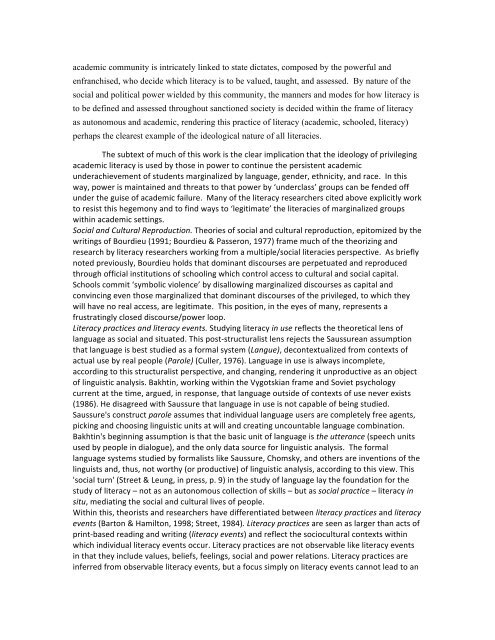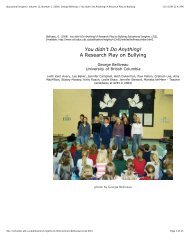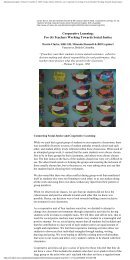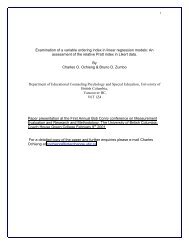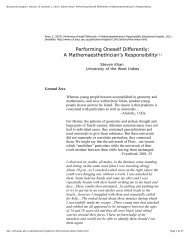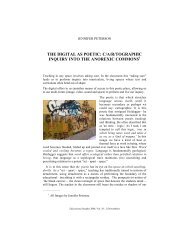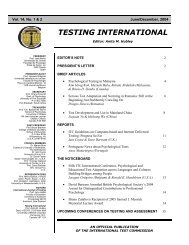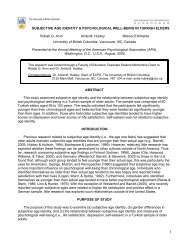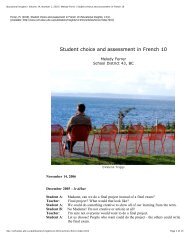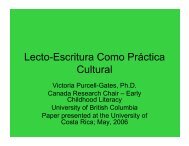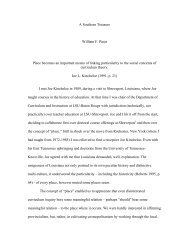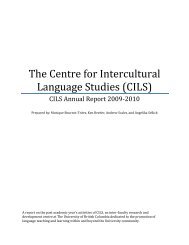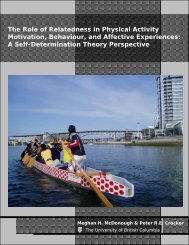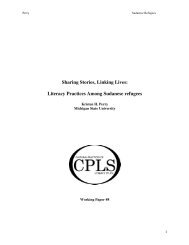Analyzing Literacy Practice - CPLS - University of British Columbia
Analyzing Literacy Practice - CPLS - University of British Columbia
Analyzing Literacy Practice - CPLS - University of British Columbia
You also want an ePaper? Increase the reach of your titles
YUMPU automatically turns print PDFs into web optimized ePapers that Google loves.
academic community is intricately linked to state dictates, composed by the powerful and<br />
enfranchised, who decide which literacy is to be valued, taught, and assessed. By nature <strong>of</strong> the<br />
social and political power wielded by this community, the manners and modes for how literacy is<br />
to be defined and assessed throughout sanctioned society is decided within the frame <strong>of</strong> literacy<br />
as autonomous and academic, rendering this practice <strong>of</strong> literacy (academic, schooled, literacy)<br />
perhaps the clearest example <strong>of</strong> the ideological nature <strong>of</strong> all literacies.<br />
The subtext <strong>of</strong> much <strong>of</strong> this work is the clear implication that the ideology <strong>of</strong> privileging <br />
academic literacy is used by those in power to continue the persistent academic <br />
underachievement <strong>of</strong> students marginalized by language, gender, ethnicity, and race. In this <br />
way, power is maintained and threats to that power by ‘underclass’ groups can be fended <strong>of</strong>f <br />
under the guise <strong>of</strong> academic failure. Many <strong>of</strong> the literacy researchers cited above explicitly work <br />
to resist this hegemony and to find ways to ‘legitimate’ the literacies <strong>of</strong> marginalized groups <br />
within academic settings. <br />
Social and Cultural Reproduction. Theories <strong>of</strong> social and cultural reproduction, epitomized by the <br />
writings <strong>of</strong> Bourdieu (1991; Bourdieu & Passeron, 1977) frame much <strong>of</strong> the theorizing and <br />
research by literacy researchers working from a multiple/social literacies perspective. As briefly <br />
noted previously, Bourdieu holds that dominant discourses are perpetuated and reproduced <br />
through <strong>of</strong>ficial institutions <strong>of</strong> schooling which control access to cultural and social capital. <br />
Schools commit ‘symbolic violence’ by disallowing marginalized discourses as capital and <br />
convincing even those marginalized that dominant discourses <strong>of</strong> the privileged, to which they <br />
will have no real access, are legitimate. This position, in the eyes <strong>of</strong> many, represents a <br />
frustratingly closed discourse/power loop. <br />
<strong>Literacy</strong> practices and literacy events. Studying literacy in use reflects the theoretical lens <strong>of</strong> <br />
language as social and situated. This post‐structuralist lens rejects the Saussurean assumption <br />
that language is best studied as a formal system (Langue), decontextualized from contexts <strong>of</strong> <br />
actual use by real people (Parole) (Culler, 1976). Language in use is always incomplete, <br />
according to this structuralist perspective, and changing, rendering it unproductive as an object <br />
<strong>of</strong> linguistic analysis. Bakhtin, working within the Vygotskian frame and Soviet psychology <br />
current at the time, argued, in response, that language outside <strong>of</strong> contexts <strong>of</strong> use never exists <br />
(1986). He disagreed with Saussure that language in use is not capable <strong>of</strong> being studied. <br />
Saussure's construct parole assumes that individual language users are completely free agents, <br />
picking and choosing linguistic units at will and creating uncountable language combination. <br />
Bakhtin's beginning assumption is that the basic unit <strong>of</strong> language is the utterance (speech units <br />
used by people in dialogue), and the only data source for linguistic analysis. The formal <br />
language systems studied by formalists like Saussure, Chomsky, and others are inventions <strong>of</strong> the <br />
linguists and, thus, not worthy (or productive) <strong>of</strong> linguistic analysis, according to this view. This <br />
'social turn' (Street & Leung, in press, p. 9) in the study <strong>of</strong> language lay the foundation for the <br />
study <strong>of</strong> literacy – not as an autonomous collection <strong>of</strong> skills – but as social practice – literacy in <br />
situ, mediating the social and cultural lives <strong>of</strong> people. <br />
Within this, theorists and researchers have differentiated between literacy practices and literacy <br />
events (Barton & Hamilton, 1998; Street, 1984). <strong>Literacy</strong> practices are seen as larger than acts <strong>of</strong> <br />
print‐based reading and writing (literacy events) and reflect the sociocultural contexts within <br />
which individual literacy events occur. <strong>Literacy</strong> practices are not observable like literacy events <br />
in that they include values, beliefs, feelings, social and power relations. <strong>Literacy</strong> practices are <br />
inferred from observable literacy events, but a focus simply on literacy events cannot lead to an


